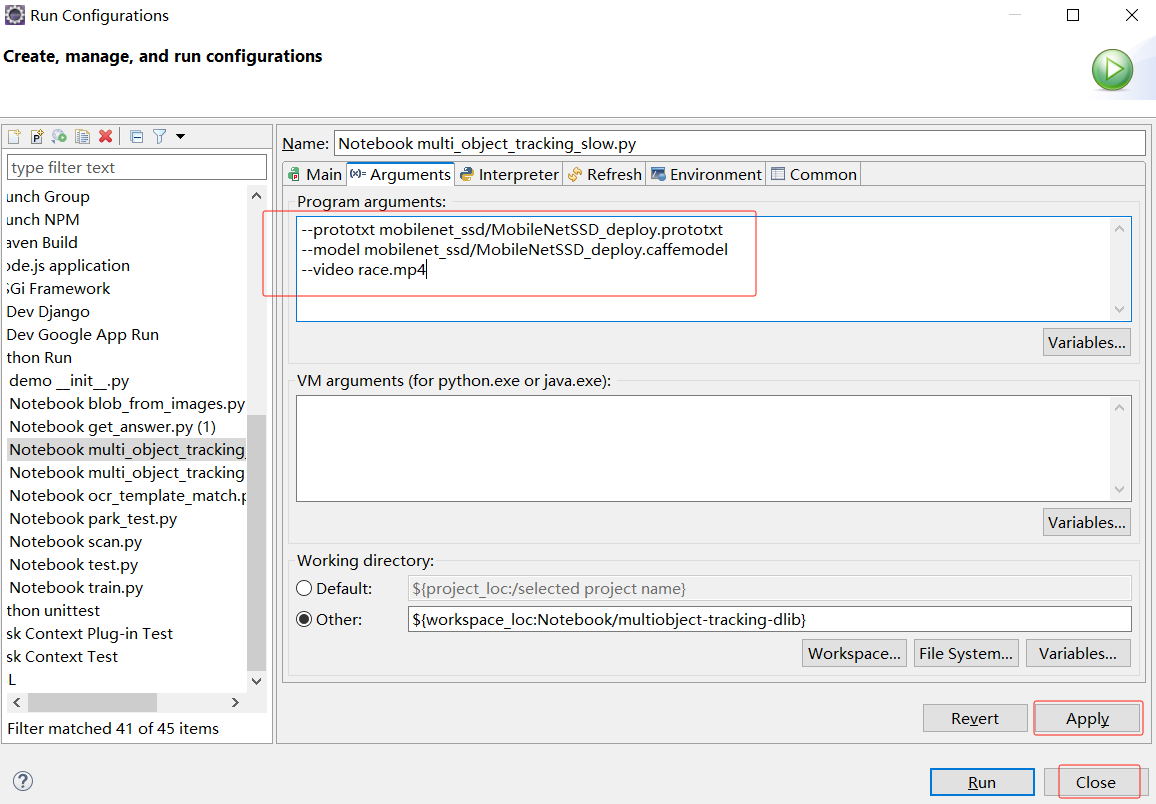C:\Users\ychen\Notebook\multiobject-tracking-dlib
λ pip install dlib-19.7.0-cp36-cp36m-win_amd64.whl
Looking in indexes: https://mirrors.aliyun.com/pypi/simple/
Processing c:\users\ychen\notebook\multiobject-tracking-dlib\dlib-19.7.0-cp36-cp36m-win_amd64.whl
Installing collected packages: dlib
Successfully installed dlib-19.7.0
--prototxt mobilenet_ssd/MobileNetSSD_deploy.prototxt
--model mobilenet_ssd/MobileNetSSD_deploy.caffemodel
--video race.mp4

#导入工具包
from utils import FPS
import numpy as np
import argparse
import dlib
import cv2
# 参数
ap = argparse.ArgumentParser()
ap.add_argument("-p", "--prototxt", required=True,
help="path to Caffe 'deploy' prototxt file")
ap.add_argument("-m", "--model", required=True,
help="path to Caffe pre-trained model")
ap.add_argument("-v", "--video", required=True,
help="path to input video file")
ap.add_argument("-o", "--output", type=str,
help="path to optional output video file")
ap.add_argument("-c", "--confidence", type=float, default=0.2,
help="minimum probability to filter weak detections")
args = vars(ap.parse_args())
# SSD标签
CLASSES = ["background", "aeroplane", "bicycle", "bird", "boat",
"bottle", "bus", "car", "cat", "chair", "cow", "diningtable",
"dog", "horse", "motorbike", "person", "pottedplant", "sheep",
"sofa", "train", "tvmonitor"]
# 读取网络模型
print("[INFO] loading model...")
net = cv2.dnn.readNetFromCaffe(args["prototxt"], args["model"])
# 初始化
print("[INFO] starting video stream...")
vs = cv2.VideoCapture(args["video"])
writer = None
# 一会要追踪多个目标
trackers = []
labels = []
# 计算FPS
fps = FPS().start()
while True:
# 读取一帧
(grabbed, frame) = vs.read()
# 是否是最后了
if frame is None:
break
# 预处理操作
(h, w) = frame.shape[:2]
width=600
r = width / float(w)
dim = (width, int(h * r))
frame = cv2.resize(frame, dim, interpolation=cv2.INTER_AREA)
rgb = cv2.cvtColor(frame, cv2.COLOR_BGR2RGB)
# 如果要将结果保存的话
if args["output"] is not None and writer is None:
fourcc = cv2.VideoWriter_fourcc(*"MJPG")
writer = cv2.VideoWriter(args["output"], fourcc, 30,
(frame.shape[1], frame.shape[0]), True)
# 先检测 再追踪
if len(trackers) == 0:
# 获取blob数据
(h, w) = frame.shape[:2]
blob = cv2.dnn.blobFromImage(frame, 0.007843, (w, h), 127.5)
# 得到检测结果
net.setInput(blob)
detections = net.forward()
# 遍历得到的检测结果
for i in np.arange(0, detections.shape[2]):
# 能检测到多个结果,只保留概率高的
confidence = detections[0, 0, i, 2]
# 过滤
if confidence > args["confidence"]:
# extract the index of the class label from the
# detections list
idx = int(detections[0, 0, i, 1])
label = CLASSES[idx]
# 只保留人的
if CLASSES[idx] != "person":
continue
# 得到BBOX
#print (detections[0, 0, i, 3:7])
box = detections[0, 0, i, 3:7] * np.array([w, h, w, h])
(startX, startY, endX, endY) = box.astype("int")
# 使用dlib来进行目标追踪
#http://dlib.net/python/index.html#dlib.correlation_tracker
t = dlib.correlation_tracker()
rect = dlib.rectangle(int(startX), int(startY), int(endX), int(endY))
t.start_track(rgb, rect)
# 保存结果
labels.append(label)
trackers.append(t)
# 绘图
cv2.rectangle(frame, (startX, startY), (endX, endY),
(0, 255, 0), 2)
cv2.putText(frame, label, (startX, startY - 15),
cv2.FONT_HERSHEY_SIMPLEX, 0.45, (0, 255, 0), 2)
# 如果已经有了框,就可以直接追踪了
else:
# 每一个追踪器都要进行更新
for (t, l) in zip(trackers, labels):
t.update(rgb)
pos = t.get_position()
# 得到位置
startX = int(pos.left())
startY = int(pos.top())
endX = int(pos.right())
endY = int(pos.bottom())
# 画出来
cv2.rectangle(frame, (startX, startY), (endX, endY),
(0, 255, 0), 2)
cv2.putText(frame, l, (startX, startY - 15),
cv2.FONT_HERSHEY_SIMPLEX, 0.45, (0, 255, 0), 2)
# 也可以把结果保存下来
if writer is not None:
writer.write(frame)
# 显示
cv2.imshow("Frame", frame)
key = cv2.waitKey(1) & 0xFF
# 退出
if key == 27:
break
# 计算FPS
fps.update()
fps.stop()
print("[INFO] elapsed time: {:.2f}".format(fps.elapsed()))
print("[INFO] approx. FPS: {:.2f}".format(fps.fps()))
if writer is not None:
writer.release()
cv2.destroyAllWindows()
vs.release()
点击查看详情

from utils import FPS
import multiprocessing
import numpy as np
import argparse
import dlib
import cv2
#perfmon
def start_tracker(box, label, rgb, inputQueue, outputQueue):
t = dlib.correlation_tracker()
rect = dlib.rectangle(int(box[0]), int(box[1]), int(box[2]), int(box[3]))
t.start_track(rgb, rect)
while True:
# 获取下一帧
rgb = inputQueue.get()
# 非空就开始处理
if rgb is not None:
# 更新追踪器
t.update(rgb)
pos = t.get_position()
startX = int(pos.left())
startY = int(pos.top())
endX = int(pos.right())
endY = int(pos.bottom())
# 把结果放到输出q
outputQueue.put((label, (startX, startY, endX, endY)))
ap = argparse.ArgumentParser()
ap.add_argument("-p", "--prototxt", required=True,
help="path to Caffe 'deploy' prototxt file")
ap.add_argument("-m", "--model", required=True,
help="path to Caffe pre-trained model")
ap.add_argument("-v", "--video", required=True,
help="path to input video file")
ap.add_argument("-o", "--output", type=str,
help="path to optional output video file")
ap.add_argument("-c", "--confidence", type=float, default=0.2,
help="minimum probability to filter weak detections")
args = vars(ap.parse_args())
# 一会要放多个追踪器
inputQueues = []
outputQueues = []
CLASSES = ["background", "aeroplane", "bicycle", "bird", "boat",
"bottle", "bus", "car", "cat", "chair", "cow", "diningtable",
"dog", "horse", "motorbike", "person", "pottedplant", "sheep",
"sofa", "train", "tvmonitor"]
print("[INFO] loading model...")
net = cv2.dnn.readNetFromCaffe(args["prototxt"], args["model"])
print("[INFO] starting video stream...")
vs = cv2.VideoCapture(args["video"])
writer = None
fps = FPS().start()
if __name__ == '__main__':
while True:
(grabbed, frame) = vs.read()
if frame is None:
break
(h, w) = frame.shape[:2]
width=600
r = width / float(w)
dim = (width, int(h * r))
frame = cv2.resize(frame, dim, interpolation=cv2.INTER_AREA)
rgb = cv2.cvtColor(frame, cv2.COLOR_BGR2RGB)
if args["output"] is not None and writer is None:
fourcc = cv2.VideoWriter_fourcc(*"MJPG")
writer = cv2.VideoWriter(args["output"], fourcc, 30,
(frame.shape[1], frame.shape[0]), True)
#首先检测位置
if len(inputQueues) == 0:
(h, w) = frame.shape[:2]
blob = cv2.dnn.blobFromImage(frame, 0.007843, (w, h), 127.5)
net.setInput(blob)
detections = net.forward()
for i in np.arange(0, detections.shape[2]):
confidence = detections[0, 0, i, 2]
if confidence > args["confidence"]:
idx = int(detections[0, 0, i, 1])
label = CLASSES[idx]
if CLASSES[idx] != "person":
continue
box = detections[0, 0, i, 3:7] * np.array([w, h, w, h])
(startX, startY, endX, endY) = box.astype("int")
bb = (startX, startY, endX, endY)
# 创建输入q和输出q
iq = multiprocessing.Queue()
oq = multiprocessing.Queue()
inputQueues.append(iq)
outputQueues.append(oq)
# 多核
p = multiprocessing.Process(
target=start_tracker,
args=(bb, label, rgb, iq, oq))
p.daemon = True
p.start()
cv2.rectangle(frame, (startX, startY), (endX, endY),
(0, 255, 0), 2)
cv2.putText(frame, label, (startX, startY - 15),
cv2.FONT_HERSHEY_SIMPLEX, 0.45, (0, 255, 0), 2)
else:
# 多个追踪器处理的都是相同输入
for iq in inputQueues:
iq.put(rgb)
for oq in outputQueues:
# 得到更新结果
(label, (startX, startY, endX, endY)) = oq.get()
# 绘图
cv2.rectangle(frame, (startX, startY), (endX, endY),
(0, 255, 0), 2)
cv2.putText(frame, label, (startX, startY - 15),
cv2.FONT_HERSHEY_SIMPLEX, 0.45, (0, 255, 0), 2)
if writer is not None:
writer.write(frame)
cv2.imshow("Frame", frame)
key = cv2.waitKey(1) & 0xFF
if key == 27:
break
fps.update()
fps.stop()
print("[INFO] elapsed time: {:.2f}".format(fps.elapsed()))
print("[INFO] approx. FPS: {:.2f}".format(fps.fps()))
if writer is not None:
writer.release()
cv2.destroyAllWindows()
vs.release()
点击查看详情





 浙公网安备 33010602011771号
浙公网安备 33010602011771号